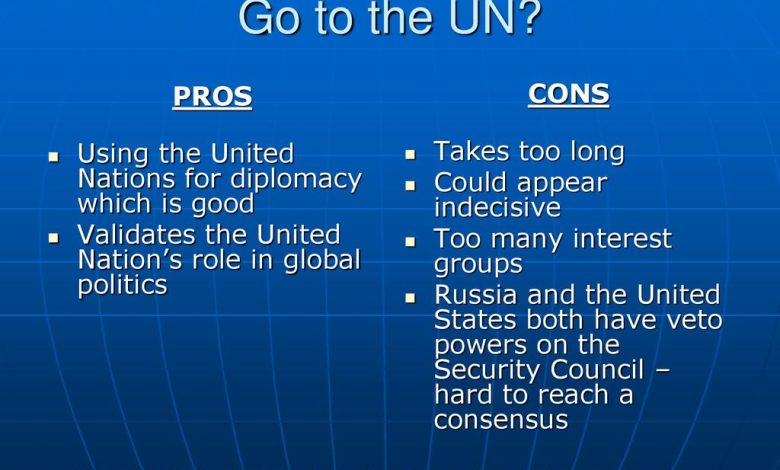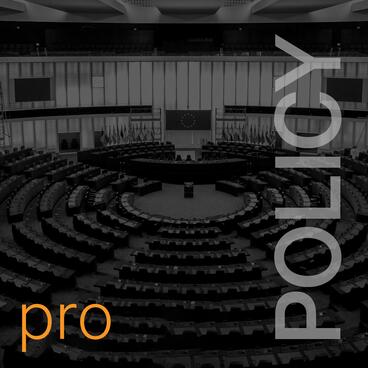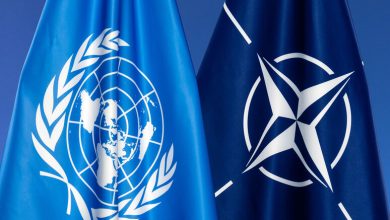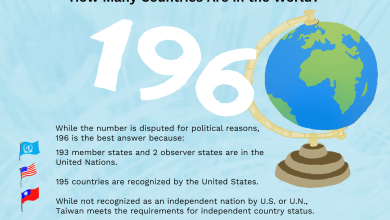Pros And Cons of Us in United Nations: Balancing Global Influence

Pros: The U.S. Provides significant funding and leadership to the United Nations.
Cons: It sometimes faces criticism for dominating the agenda. The United States plays a crucial role in the United Nations. As a founding member and one of the largest financial contributors, the U. S. Wields substantial influence. The U. S.
Helps shape international policies, promote human rights, and support peacekeeping missions. Nonetheless, its dominance can sometimes overshadow the voices of smaller nations. Critics argue that U. S. Interests often dictate U. N. Actions, leading to biased decisions. Despite these criticisms, the U. S. ‘s involvement remains vital for addressing global issues. Its leadership and resources are essential for the U. N. To function effectively. Balancing power dynamics and ensuring fair representation are ongoing challenges.
:max_bytes(150000):strip_icc()/GettyImages-969575134-d1a3fa8653784ccb911706910cd8505a.jpg)
Credit: www.investopedia.com
U.s. Role In Global Peacekeeping
The U.S. has been a key player in the United Nations since its formation. The country helped create the UN Charter in 1945. American troops have often led peacekeeping missions around the world. This includes conflicts in Korea, Bosnia, and Somalia. The U.S. has provided substantial financial support to the UN. Many American leaders have served in top UN positions.
Today, the U.S. remains active in many UN peacekeeping missions. American troops are stationed in places like South Sudan and Mali. The U.S. also provides logistical and financial support. This includes funding for training and equipment. The country participates in UN debates and decisions. Strong American leadership continues to influence global peace efforts.
:max_bytes(150000):strip_icc()/Industrial-Revolution-V2-7493ff6ba09e4612b1c1e3d5c2eb49c5.jpg)
Credit: www.investopedia.com
Economic Influence Through The U.n.
The U. S. holds significant economic influence through its United Nations participation, driving global policies and economic stability. Critiques point to sovereignty concerns and financial burdens, sparking debates on the pros and cons of this international role. Balancing power with collaboration remains a key challenge for U.
S. involvement in the U. N.
Financial Contributions
The United States gives a lot of money to the United Nations. This helps many programs and projects. These funds support peacekeeping missions and humanitarian aid. Many countries rely on this support. But, giving so much money can be a burden. Some people feel the U.S. should spend more on its own needs.
Trade Policies
The U.N. helps make trade rules. These rules can help U.S. businesses. They make trade fair and open. Small businesses can sell more products overseas. But, some rules can hurt U.S. industries. Sometimes, they need to follow stricter standards. This can make products cost more.
Humanitarian Efforts
Evaluating the pros and cons of US participation in the United Nations reveals complex impacts on global humanitarian efforts. US involvement provides significant funding and leadership but sometimes faces criticism for selective engagement and political influence.
Aid Programs
The US provides food and medical aid to many countries. This helps people in need. Many children get vaccines because of US aid programs. US aid helps build schools and hospitals. This improves education and health. US aid programs save many lives.
Crisis Response
US helps in disaster relief during hurricanes, earthquakes, and floods. Many rescue teams are sent to save people. US also provides supplies like food, water, and blankets. This helps people survive during crises. US is a key player in global crisis response.
Political Power And Diplomacy
The United States has a veto power in the United Nations. This means it can stop any decision from being made. Veto power gives the US a lot of control. It can use this to protect its interests. But it can also make other countries angry. Some people think this power is too strong. Others believe it helps keep peace.
The United States has many international alliances through the United Nations. These alliances help the US work with other countries. They share resources and information. This can make the world safer. But alliances can also create conflicts. Some countries may feel left out. Others may disagree on important issues. Balancing these alliances is not always easy.
Challenges And Criticisms
The United Nations often faces bureaucratic delays. These delays can slow down important decisions. Many members feel frustrated by the complex processes. This can lead to inefficiency in handling global issues. Simplifying procedures could help. But, achieving this remains a significant challenge.
The United States holds a powerful position in the UN. Some countries see this as dominating. They believe the US has too much influence. This can create tensions among member nations. The US needs to balance its leadership role. It must also respect the views of other countries.

Credit: thecyberwire.com
Frequently Asked Questions
What Were The Pros And Cons Of The United States Joining The United Nations?
Joining the United Nations boosted the U. S. global influence and promoted international cooperation. It also shared global peacekeeping burdens. Some cons included financial costs and potential conflicts with national interests.
Why Should The Us Be In The United Nations?
The US should be in the United Nations to promote global peace, security, and cooperation. It helps address international issues and fosters diplomatic relations. Membership enhances the US’s influence in global decision-making and supports humanitarian efforts.
What Are The Pros And Cons Of Working In The United Nations?
Working at the UN offers global impact, diverse cultures, and career growth. Challenges include high competition, bureaucracy, and frequent relocations.
What Has Been An Advantage Of Us Participation In The United Nations?
US participation in the United Nations has promoted global peace and security. It has helped foster international cooperation and diplomacy.
Conclusion
Balancing the pros and cons of US involvement in the United Nations is crucial. While it offers global influence, it also demands significant resources. Understanding these dynamics helps make informed decisions. Engage in the dialogue, and consider the broader implications for future policy and international cooperation.



